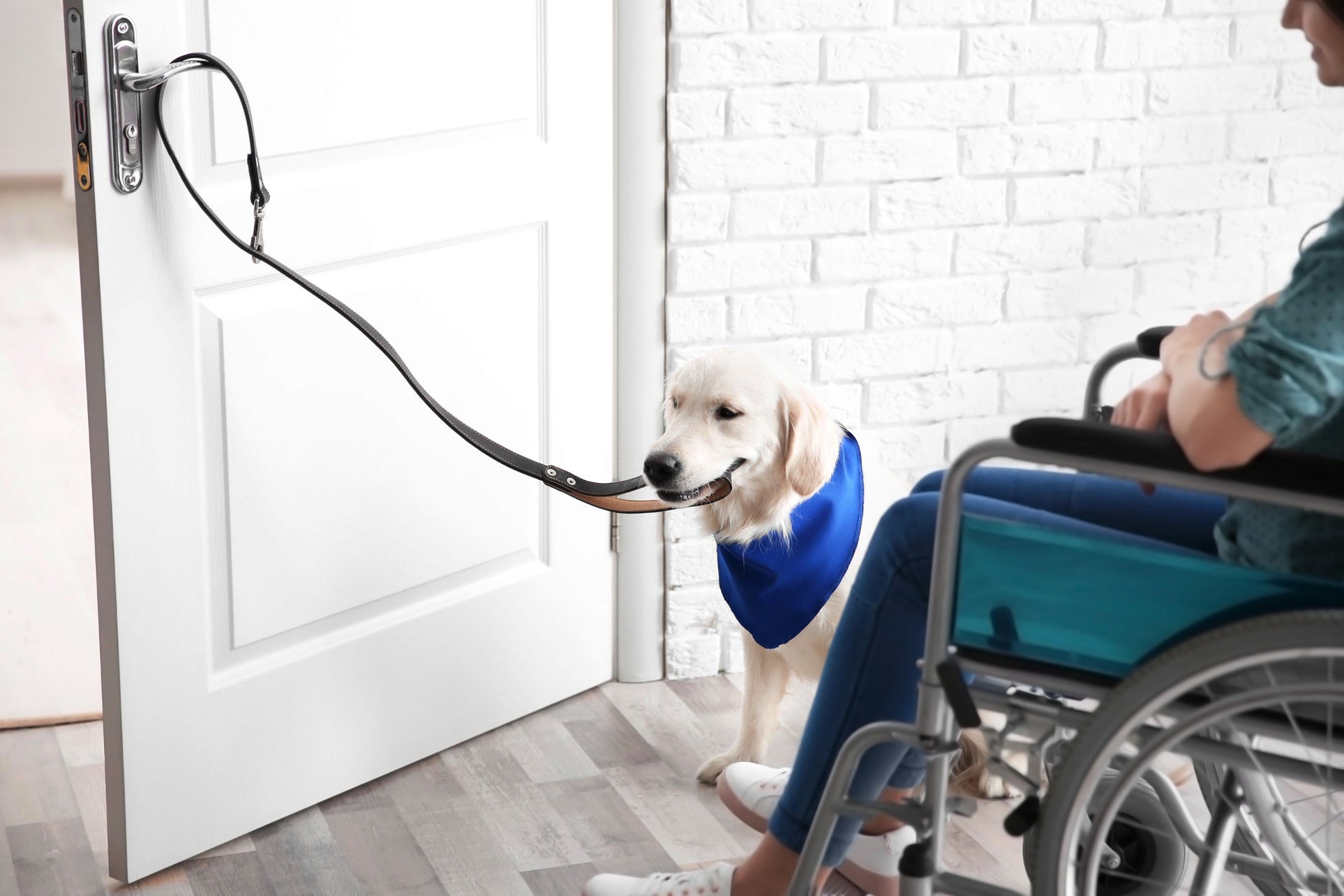
National Service Dog Month
September 15, 2022What is National Service Dog Month? This is a time to celebrate the critical work that service dogs do every day. These amazing animals are a vital part of the lives of many people with disabilities and play a crucial role in helping these individuals live more independently.
This blog post will discuss how service dogs make life easier for their owners and why four-legged friends make the best assistants!
Benefits of a Service Dog
What are the benefits of having a service dog in your life, both physically and mentally?
First and foremost, service dogs provide companionship and unconditional love. For many people with disabilities, their service dog is their only source of social interaction and emotional support. Service dogs can also help to reduce anxiety and isolation.
Secondly, service dogs are highly trained to perform specific tasks that assist their owners with everyday activities. These tasks can range from simple things like opening doors and picking up dropped items to more complex tasks such as providing balance assistance or helping with asthma attacks. No matter what the job may be, service dogs make life much easier for their owners daily.
Lastly, research has shown numerous health benefits associated with owning a pet, including lower blood pressure and cholesterol levels, increased cardiovascular health, and increased levels of serotonin and dopamine (known to have mood-boosting effects). Service dogs provide all these benefits and more to their owners, making them an invaluable part of the family.
So, this National Service Dog Month, take a moment to appreciate all service dogs do for their owners daily. They, indeed, are man's best friends!
How Service Dogs Help
Service dogs help those who suffer from various disabilities or illnesses, such as PTSD or diabetes mellitus type 1, cancer, and even Alzheimer's.
PTSD and Other Mental Health Conditions

PTSD, or post-traumatic stress disorder, is a mental illness that can develop after someone experiences or witnesses a traumatic event. Symptoms of PTSD include flashbacks, nightmares, anxiety, and depression.
A service dog can be a valuable asset to someone who has PTSD. The dog can provide comfort and security in situations that trigger PTSD symptoms. For example, if a person with PTSD has a flashback of being in a car accident, their service dog can provide deep pressure therapy by leaning against them or licking their hand. This helps to ground the person in the present and calm them down.
Service dogs can also serve as an early warning system for people with PTSD. For example, if a person with PTSD hears a loud noise that reminds them of a combat situation, their service dog can alert them to the potential danger and help them avoid a panic attack.
Service dogs are not just for people with PTSD. They can also be trained to assist people with other mental health conditions, such as anxiety, depression, and bipolar disorder. If you suffer from these conditions, a service dog could be a valuable asset to your treatment plan.
Talk to your doctor or mental health professional if you think a service dog could help you manage your mental health condition. They can help you determine if a service dog is right for you and, if so, put you in touch with a reputable training program.
Diabetes Mellitus Type 1
Service dogs can also be trained to assist people with diabetes. They can be trained to alert their owners when their blood sugar is getting low or high, and they can even be trained to retrieve medication or food. If you have diabetes, a service dog could give you peace of mind knowing that someone has your back 24/7.
Cancer
Service dogs can also provide emotional support during treatment and in recovery. If you or someone you love has cancer, a service dog could make a world of difference while you are fighting to get better.
Alzheimer's and dementia
For people with Alzheimer's or dementia, a service dog can provide much-needed companionship and help with tasks such as opening doors, picking up things that have been dropped, and providing reminder cues.
If you or someone you know has Alzheimer's or dementia, a service dog could be a welcome addition to your life.
Service dogs are amazing animals that provide vital assistance to their owners. If you think you might benefit from having a service dog, please reach out to a reputable organization that can help you get matched with the perfect furry partner.
Specific Breed?

Are any specific breeds of dogs better suited for becoming service animals than others?
The answer to this question is complicated. Some might say that Labrador Retrievers or Golden Retrievers make the best service dogs because they are bred to be working dogs and have a natural affinity for people. Other people might say that any breed of dog can make a great service dog with the right temperament and personality.
There is no one-size-fits-all answer to this question. The best way to decide if a particular breed of dog would make a good service animal for you is to speak with a qualified trainer or organization that matches service dogs with people in need. They will be able to assess your individual needs and match you with a dog that has the perfect personality and temperament for the
Want a Service Dog?
How can you go about getting a service dog if you feel like you could benefit from one in your life?

There are a few different ways to get a service dog. You can:
- Adopt a trained dog from a reputable organization or breeder
- Train your own dog
- Adopt a dog from a shelter or rescue organization and then train it yourself
If you decide to train your dog, it's essential to make sure that you choose a breed that is typically known for being intelligent and easy to train. Some popular breeds that make great service dogs include Labrador Retrievers, Golden Retrievers, German Shepherds, and Poodles.
You'll also want to ensure that you train your dog as early as possible - the sooner you start, the better! Service dogs need to be incredibly well-behaved, so it's vital to put in the time and effort to train them properly.
Fish Oil for Dogs
As service dog training can be stressful for your canine companion, it is important to keep track of their health and ensure they are in good health. Fish oil for dogs can be beneficial to keep them mentally and physically active with their training. The use of fish oil supplements in dietary additions to cure skin allergies and cancer in animals is not new. Omega-3 fatty acids are abundant in fish oil supplements. This includes eicosapentaenoic acid (EPA) and docosahexaenoic acid (DHA). They both play an important role in combating inflammatory diseases.
Finally, remember that service dogs are not just for people with physical disabilities - they can also benefit people with mental health conditions like anxiety, depression, and PTSD. If you think a service dog could help you or someone you know, don't hesitate to contact a reputable organization for more information.

